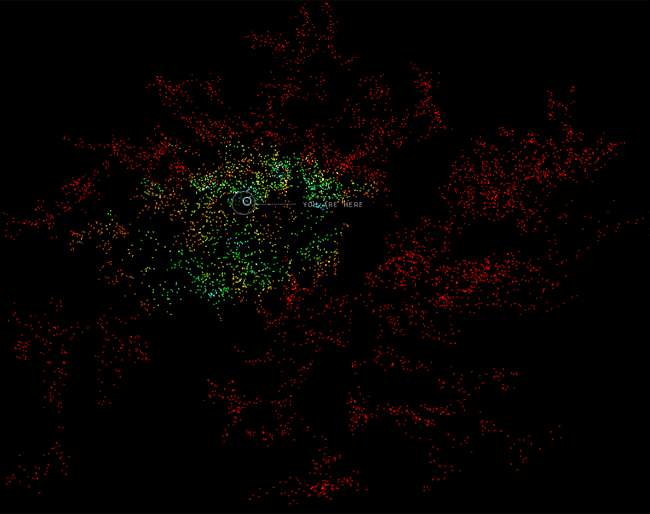Summertime,I have some questions.
And the livin' is easy
Fish are jumpin'
And the cotton is high
Oh, Your daddy's rich
And your mamma's good lookin'
So hush little baby
Don't you cry
- Where did all the PLEX cash flow go?
- When will Trit turn back up?
PLEX prices - 3 month view (sinq region)
 Wow. May & June 2009 PLEX prices were insane.
Wow. May & June 2009 PLEX prices were insane.We can go around and around about WHY this happened, starting with the argument that the recent offer around using PLEX for Fanfest was the main cause. I don't believe any one argument about causes wins. This cannot be explained by Fanfest. There was no significant jump in either demand or trade volume. If anything, it was caused by a supply shortage and not by demand.
In Sinq Laison alone, there are 50-100 trades a day. That meant 20-40 trillion ISK a day, just in one region. By my calculation, this month of steep price increases accounts for about 10 trillion ISK a day (in Sinq) of extra cash. That's enough cash to buy out all the tritanium in each region, several times over. In raw volume terms, PLEX trading apparently dwarves all other market phenomenon.
Market manipulation?
One odd thing I did notice was fairly substantial coordination of price shifts in MANY regions simultaneously. To be specific, I was traveling around during the peek of PLEX insanity and watching prices in multiple regions. PLEX prices were being simultaneously raised in "quiet" regions as well as the trade hub regions. There were many regions with only 2 PLEX for sale, in strange locations, having their prices raised at the same time they were being raised in Jita, Dodi, etc. I found this peculiar, because it indicated that a handful of traders had obscene amounts invested in PLEX and were manipulating prices in coordination. To be specific, I witnessed sales prices on PLEX in 3-4 scattered regions (including quiet ones with only 1-3 plex for sale) simultaneously rising by similar jumps within a few minutes of each other. I ran around many regions and found the trend was maintained to suit the large volumes of sales in the trade hubs... as if actively coordinated.
In fact, I got the distinct impression that 1-2 major traders were simply buying out the PLEX market and price gouging. I'd be 100% convinced of this if it weren't for the simple fact that I can't believe anybody has that much ISK (tens of trillions). Likewise, such behavior would indicate one of the most risky investments possible, because nobody in their right minds would believe those >400m prices could last even if they were properly manipulating with active trading at ever-higher prices. Nonetheless, volume in Sinq barely dropped to under 50 a day and it looks like there was a significant spike where nearly 100 were sold at 400m.
Did somebody engage in a massive gambit? If so, i think it involved coordinated efforts of a corporation or some equiv group of traders. Perhaps it wasn't entirely their doing, but they could have tapped into the trend and exacerbated it. Some people cashed out very nicely.
PLEX prices - 3 month view (forge region)

Other possible factors? It's summer during a global recession. A lot of players potentially ended up on vacation. There's also a shift in real life cash flow, with strained RL economies. There appears to be a minor trend in monthly demand, but this went beyond that.
Perhaps a very simple explanation is that players bought less PLEX with real cash. School ended. Times are tough. Perhaps players had less cash to invest into gaming? I'd strongly favor this theory, but it would seem to me that it would be matched by an increase in demand for in-game PLEX to pay for subscriptions with ISK. However, there was no significant increase in volume from what I can see. What we did see was an explosion in ISK cash flow.
This leads me to the more basic question. The month-long upwards swing in ISK cashflow from PLEX was not tied to any apparent inflation in general prices, so where did that 10+ trillion ISK a day go?
Where did all that cash go?
It certainly did not go into buying Tritanium... which has been steadily dropping like a rock, lately. Some argue it's due to a lack of demand for new warfare ships. I wonder.
Tri: 3 month prices (sinq region)

Trit: 3 month prices (Forge region)

I don't see indication of a major drop in demand, quite the opposite when you look at 6 month trends. This leads me to speculate that this is a supply-side phenomenon. So then, what would account for a significant increase in trit supplies?
How about summer time? More mission running & reprocessing? More mining? Is this part of a more general annual cycle? Is trit usually in decline for june/august?
Let's look at the Quarterly Economic Newsletters for clues.
QEN Q1 2008: Trit prices

It's hard to suggest there's a strong trend towards lower trit and mineral prices during the summer, but the evidence could also support the notion of supply increases. Trit prices have historically had some other factors holding prices down. Last year we saw trit "decoupled."
Trit: 1 year market history (Sinq region)

So, are we currently seeing trit settling downwards? Or is this a temporary fluctuation due to a wave of summer supply? CCP's QENs indicate that trit demand has been at a steady increase, and the market volumes indicate the same.
My suspicion is that a new baseline is being felt out and that we're touching it at 3.80 or so.
PREDICTIONS:
I'd wager that as August comes, we'll see some massive buy orders on Trit and a fast incline perhaps to 4.20-4.30 range.
PLEX demand looks fairly stable, but I suspect we'll see an increase in PLEX items in late August and September. A lot of the new players from this Spring & Summer may be in a position to want ISK. I predict a drop in prices below 300m, then coming back up towards Oct and going way up again (350m) by Dec.
I'd wager that we'll also see extreme volatility in T1 salvage mat prices in august and september, but rational prices won't settle until both player stockpiles run dry and CCP explains the changes in drop rates.




No comments:
Post a Comment